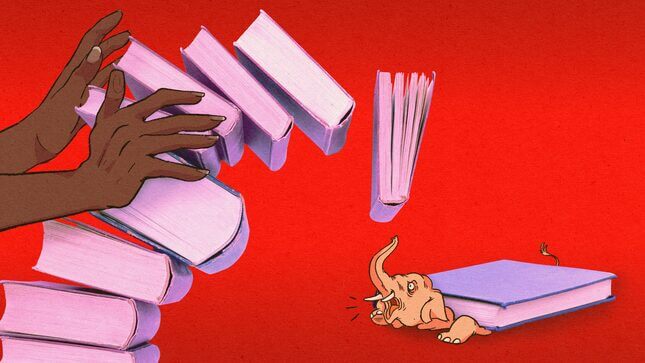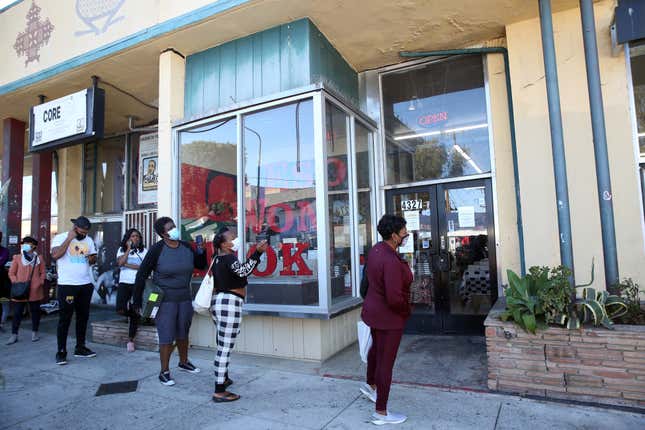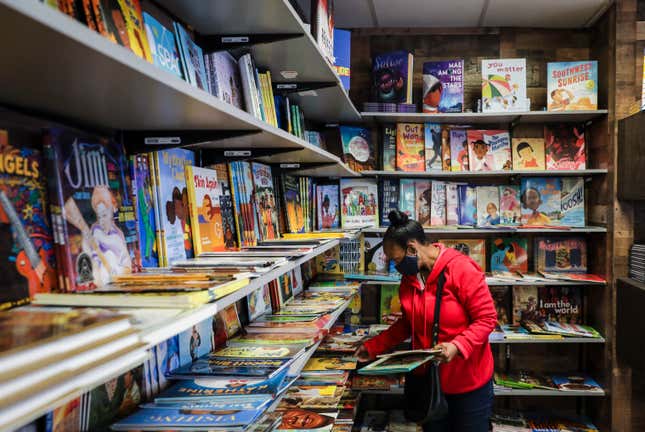Black-Owned Bookstores Safeguard Our History as Racists Try to Ban It
Republican politicians are working to prohibit books that cause "white discomfort" in classrooms, so Black bookstore owners are fighting back.
In DepthIn Depth
Illustration: Allison Corr
During my high school slavery unit, into which the entirety of Black history was compressed, my teacher decided to play “Devil’s advocate”—his words—and ask, “Well, wasn’t slavery good for the economy?” As a teenager, I remained silent. Now, as an adult, I realize just how harmful his question was, especially in our classroom of majority Black and Brown students.
American history has always been taught this way. “The economy” in my teacher’s sentence clearly referred to white people’s economy, for Black people’s “economy” was worse than dire. To teach Black children this whitewashed version of America is to teach Black children that they are marginal characters in their own lives, to reinforce the idea that Black people cannot exist outside of the white gaze; we only exist in relation to whiteness.
If this is the state of our education system, where, then, do we go for real learning—for what bell hooks called education as the practice of freedom? If our schools are under the control of the same government responsible for treating Black learning as a fugitive act; if the curriculum teaches us to praise Founding Fathers who owned our ancestors, beating and raping them at will; if the well-intentioned white teachers who come into our inner cities through Teach for America et al. know nothing of us; if our politicians can suddenly make laws banning not just books about our real history but also any books that make white students uncomfortable—if this is the state of our education system, where do we turn? We turn, more and more, to Black-owned bookstores.
Jamaican-born Desmond A. Reid, an avid reader who went to printing school before moving to the United States, founded Dare Books 40 years ago in Longwood, Florida. “When I decided to go to my first PTA meeting, I asked the principal to show me the library,” he explained. “In a school that had mostly Black and Latino children, I noticed there were no books that reflected those children—none whatsoever that I saw.” So he took it upon himself to right the wrong. “If it is to be, it is up to me to gather and disseminate the material dealing with the contributions of Black people in this country and across the world,” he told me.

There aren’t even 150 Black-owned bookstores in the United States, meaning they account for about 5 percent of indie bookstores, but they have always been a pillar of Black education and liberation. Our country’s first Black bookstore owner, David Ruggles, not only sold abolitionist literature but also used his New York City bookstore as a safehaven for those escaping slavery in the 1830s, before it was destroyed by a white mob. During the Black Power Movement of the ‘60s and ‘70s, when Black-owned bookstores selling anti-colonialist literature and supporting Black liberation grew in popularity, FBI director J. Edgar Hoover led a nationwide attack on these businesses, calling them “propaganda outlets for revolutionary and hate publications and culture centers for extremism.”
The most recent challenges verge on existential: As politicians work to ban critical race theory (CRT) and white “discomfort” in classrooms, signaling an attack on the very core of what these bookstores are attempting to teach, bookstore owners are responding. They are ordering more copies of Derecka Purnell’s Becoming Abolitionists, Michelle Alexander’s The New Jim Crow, and Isabel Wilkerson’s Caste. They are beefing up their already impressive array of speakers’ series. They are, in short, trying to keep us educated, at a time when our schools—already a place of control and suppression for many Black students—are being threatened by Republican politicians.
In a country where white power structures insist on a colonizing curriculum favoring white “heroes,” white perspectives, and white myths, Black bookstores offer a breath of fresh air: the truth.
The desire to share the truth about our people led Akbar Watson to open Pyramid Books in Boynton Beach, Florida, a decade later than and three hours south of Reid’s Dare Books, when he and his friends wanted to read independently published titles by Black authors that were hard to come by. Watson turned his small efforts buying these books wholesale and retailing them out into a full-fledged bookstore. When I asked him what types of books he sells today, he didn’t hesitate: “Pyramid Books is an African-centered bookstore. Historically, we’ve been erased out of history. What I want to do is fill in that gap and represent a people that hasn’t been represented in a positive light in the literature arena.” His bookstore’s website proudly proclaims, “Fight the Power, Read Banned Books!”—subtly reminding us that, at one point, all books were banned to Black people on these shores.
-

-

-

-

-

-

-

-

-

-

-

-

-

-

-

-

-

-

-

-

-

-

-

-

-

-

-

-

-

-

-

-

-

-

-

-

-

-

-

-









































